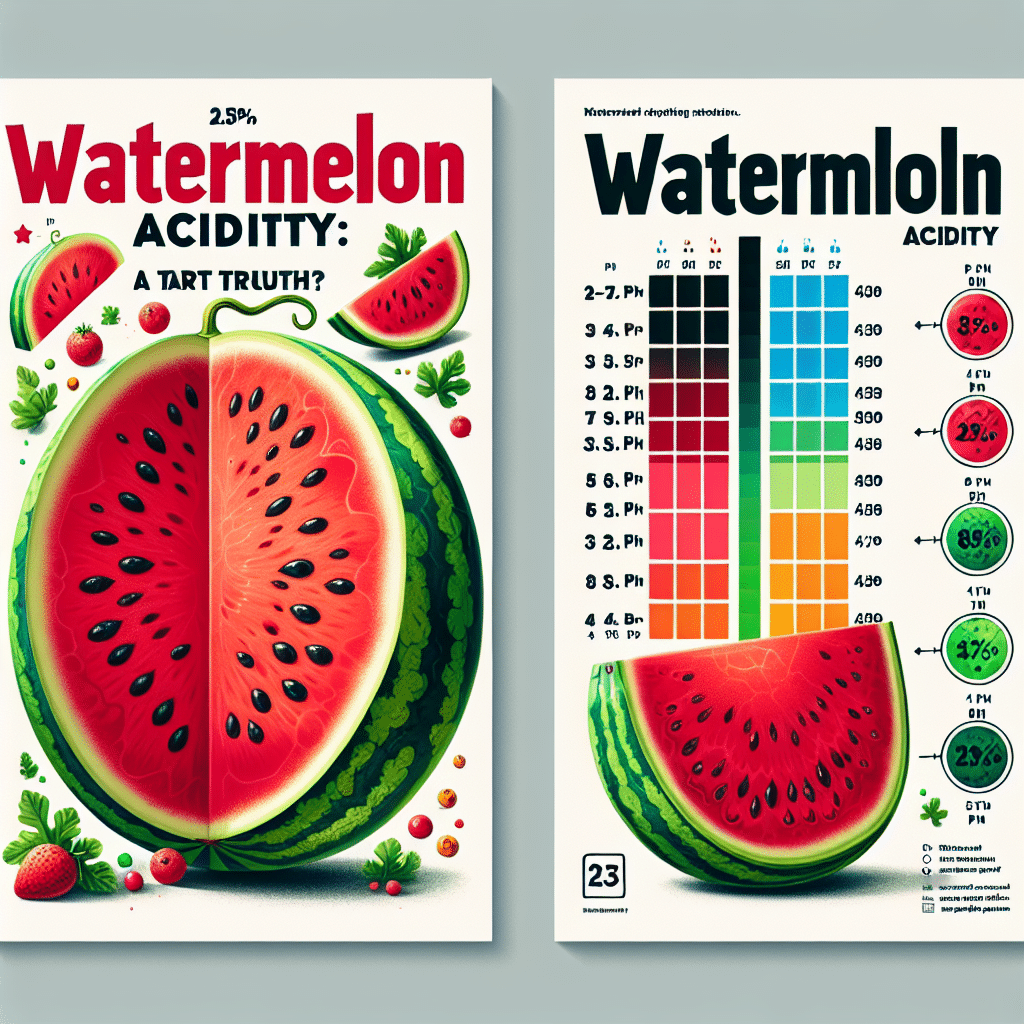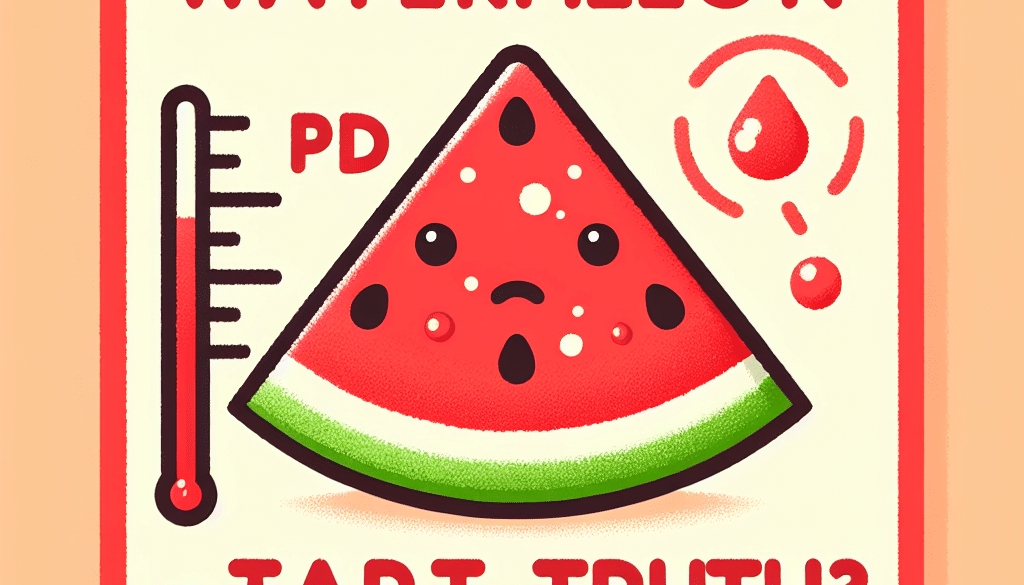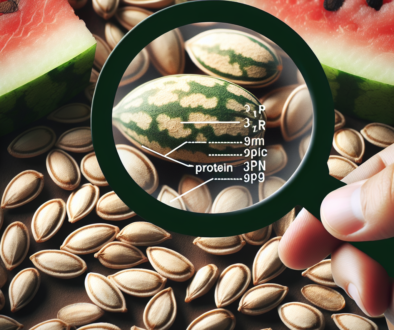Watermelon Acidity: A Tart Truth?
-
Table of Contents
- Watermelon Acidity: Unveiling the Tart Truth Behind the Sweetness
- Understanding Watermelon Acidity
- The Role of Acidity in Flavor
- Acidity’s Impact on Health
- Preservation and Ripeness
- Case Studies and Research
- Statistics on Watermelon Consumption
- Conclusion: The Sweet and Sour of Watermelon
- Discover ETprotein’s Watermelon Seed Protein Products
Watermelon Acidity: Unveiling the Tart Truth Behind the Sweetness

Watermelon is a quintessential summer fruit, known for its refreshing sweetness and hydrating properties. However, there’s more to this juicy fruit than meets the eye. The acidity of watermelon is a topic that often goes unnoticed, yet it plays a crucial role in the fruit’s taste, preservation, and even its impact on our health. In this article, we’ll delve into the tart truth about watermelon acidity, exploring its implications and offering insights into this beloved fruit.
Understanding Watermelon Acidity
Acidity in fruits is determined by the presence of organic acids, which contribute to their overall flavor profile. In watermelons, the primary acid is citric acid, which is also found in citrus fruits, though in much lower concentrations. The pH level of watermelon typically ranges from 5.2 to 5.6, making it less acidic than many other fruits.
The Role of Acidity in Flavor
The balance between sweetness and acidity is what gives watermelon its distinctive taste. While watermelons are predominantly sweet due to their high sugar content, the subtle acidity enhances the flavor, making it more vibrant and refreshing. This interplay is crucial for the overall sensory experience of enjoying a slice of watermelon.
Acidity’s Impact on Health
Watermelon’s mild acidity can have various effects on our health. For most people, consuming watermelon poses no health risks and can be part of a balanced diet. However, for individuals with acid reflux or other gastrointestinal issues, understanding the acidity levels in foods is essential. Fortunately, watermelon’s low acidity makes it a suitable option for many with these conditions.
Preservation and Ripeness
The acidity of watermelon also influences its shelf life and ripeness. As watermelons ripen, their acidity decreases, which can affect both taste and how long they stay fresh. Measuring the pH level of watermelon can be an indicator of its ripeness, with a lower acidity often signaling that the fruit is ready to eat.
Case Studies and Research
Several studies have examined the acidity of watermelon and its components. For instance, research on watermelon juice has shown that its pH can affect the growth of microorganisms, which is crucial for food safety and preservation. Additionally, studies on the health benefits of watermelon have highlighted its alkalizing effect on the body, despite its acidity.
Statistics on Watermelon Consumption
Watermelon is not only a popular fruit in the United States but also around the world. According to the Agricultural Marketing Resource Center, the U.S. per capita consumption of watermelon was approximately 16 pounds in recent years. Globally, countries like China lead in watermelon production, reflecting its widespread appeal.
Conclusion: The Sweet and Sour of Watermelon
In conclusion, watermelon acidity is a nuanced aspect of the fruit that affects its taste, health implications, and preservation. While watermelon is relatively low in acidity compared to other fruits, this characteristic is essential to its unique flavor profile and potential health benefits. Understanding the tart truth behind watermelon’s sweetness allows us to appreciate this summer staple even more.
Discover ETprotein’s Watermelon Seed Protein Products
If you’re intrigued by the benefits of watermelon and are looking for a plant-based protein source, ETprotein offers a range of watermelon seed protein products. These proteins are not only derived from a beloved fruit but also boast a neutral taste, non-GMO, and allergen-free attributes, making them an excellent addition to any diet.
Whether you’re involved in the nutraceutical, pharmaceutical, or food and beverage industry, ETprotein’s watermelon seed protein can meet your needs. Their commitment to quality and customer satisfaction makes them a top choice for anyone seeking organic bulk vegan protein and plant proteins.
About ETprotein:
ETprotein, a reputable watermelon seed protein Chinese factory manufacturer and supplier, is renowned for producing, stocking, exporting, and delivering the highest quality organic bulk vegan protein and plant proteins. They include Organic rice protein, clear rice protein, pea protein, clear pea protein, watermelon seed protein, pumpkin seed protein, sunflower seed protein, mung bean protein, peanut protein etc. Their offerings, characterized by a neutral taste, non-GMO, allergen-free attributes, cater to a diverse range of industries. They serve nutraceutical, pharmaceutical, cosmeceutical, veterinary, as well as food and beverage finished product distributors, traders, and manufacturers across Europe, USA, Canada, Australia, Thailand, Japan, Korea, Brazil, and Chile, among others.
ETprotein specialization includes exporting and delivering tailor-made protein powder and finished nutritional supplements. Their extensive product range covers sectors like Food and Beverage, Sports Nutrition, Weight Management, Dietary Supplements, Health and Wellness Products, and Infant Formula, ensuring comprehensive solutions to meet all your protein needs.
As a trusted company by leading global food and beverage brands and Fortune 500 companies, ETprotein reinforces China’s reputation in the global arena. For more information or to sample their products, please contact them and email sales(at)ETprotein.com today.












